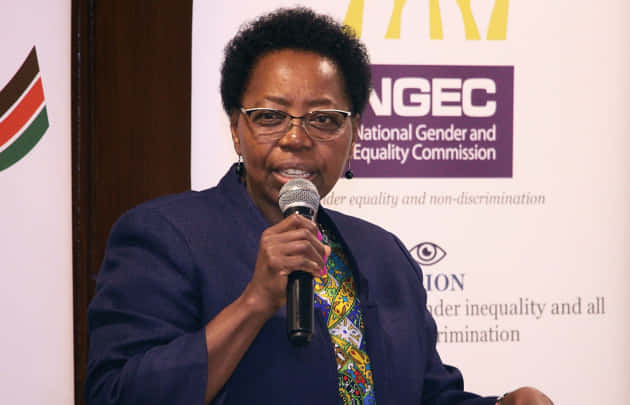STATEMENT ON THE 2023 INTERNATIONAL DAY FOR PERSONS WITH DISABILITIES
The National Gender and Equality Commission (NGEC) joins all Persons with Disabilities in Kenya and the world at large in observing the United Nations International Day of Persons with Disabilities for the year 2023. The observance of the day aims to promote an understanding of disability issues and mobilize support for the dignity, rights, and well-being of persons with disabilities.
The theme for IDPWD 2023 is “United in action to rescue and achieve the Sustainable Development Goals (SDGs) for, with, and by persons with disabilities”.
Persons with Disabilities (PWDs) constitute a significant proportion of the global population. In Kenya, they constitute 2.2% (0.918 million)[1] of the total population. Therefore, their contribution and participation in all aspects of society is not just a matter of human rights but a strategic imperative for achieving social and economic development, including the Sustainable Development Goals (SDGs). However, barriers such as societal attitudes, inaccessible infrastructure, and limited opportunities hinder the full realization of their potential.
Kenya has made significant progress in the promotion and protection of the rights of PWDs such as the provision of enabling legal and policy frameworks, promotion of inclusive education, employment, infrastructure, health services, social protection, and community participation among others. There is a growing recognition of the diverse talents and contributions of PWDs in society, an indication of this progress. The Commission acknowledges the collaborative efforts of the government, private sector, and non-state actors in promoting the rights and inclusion of PWDs.
The Constitution of Kenya, 2010 has made various provisions to protect and promote the rights and needs of PWDs. For example, Article 54 specifically provides for the entitlements to PWDs, Article 21 calls for the implementation of rights and fundamental freedoms, and Article 43 provides for Economic and Social Rights among other articles. Complementary legal and policy frameworks, including the Persons with Disabilities Act 2003, Basic Education Act 2013, Health Policy 2014-2030, and National Social Protection Policy 2017, further reinforce the nation's commitment to the inclusion of PWDs. In addition, Kenya ascribes to various international and regional human rights instruments on matters affecting PWDs. Key among these include the UN Convention on the Rights of Persons with Disabilities (UNCRPD), and Agenda 2030 for Sustainable Development.
However, despite these efforts, PWDs continue to face many barriers that hinder their personal, social, economic, and political development. They include economic vulnerability, inadequate representation and participation, mobility, information and communications barriers, societal attitudes and stereotypes, lack of comprehensive data/research on issues of disability, limited opportunities, and gaps in the enforcement of existing laws and policies among others.
To address these challenges and achieve the Sustainable Development Goals (SDGs), the Commission calls for an inclusive and multi-sectoral approach. This involves dismantling societal stereotypes through awareness campaigns, implementing universal design principles for accessible infrastructure, and promoting inclusive health, education, and employment policies. Collaboration between the Government, non-governmental organizations, and the private sector is essential to create an environment where PWDs can thrive and actively contribute to the nation's progress.
Further, the Commission calls for the involvement of PWDs in all decision-making levels, ensuring their voices are heard and their unique perspectives considered. We also call upon the private sector to promote research and develop affordable and locally adaptable assistive technologies. There is a need to invest in research to gather accurate and up-to-date data on the prevalence and needs of PWDs, to enable evidence-based policy-making.
The Commission urges the Government to prioritize and allocate adequate financial resources for disability-inclusive development, mainstream disability across all aspects of development and enforce existing policies and laws. We call upon the National Assembly to fast-track the enactment of the PWD Bill,2023.
On this International Day for Persons with Disabilities, let us renew our commitment and unite to break all barriers and create a world where persons with disabilities are not only beneficiaries but active contributors to the achievement of Sustainable Development.
The National Gender and Equality Commission reaffirms its commitment to promoting gender equality and eliminating all forms of discrimination, including those faced by persons with disabilities.
Together “we can unite in action to rescue and achieve the Sustainable Development Goals (SDGs) for, with, and by persons with disabilities”.
Thank you.
SIGNED
Dr. Joyce M. Mutinda, PhD, EBS.
Chairperson
The National Gender Equality Commission
[1] Kenya Bureau of Statistics. (2019). Kenya Population and Housing Census 2019


Comments